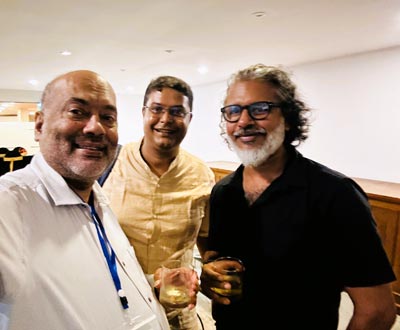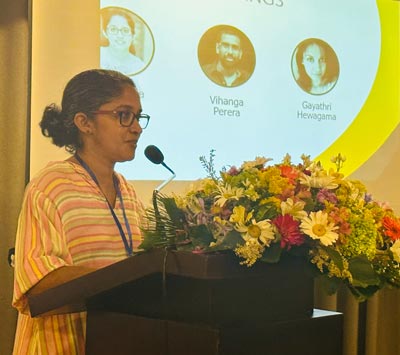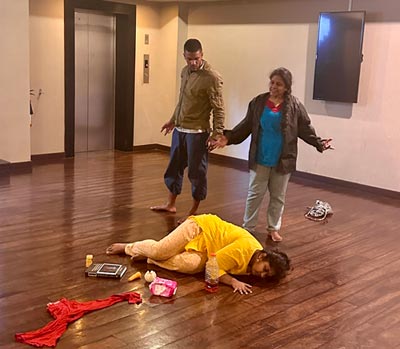Looking back on a varied canvas of postcolonial literature

Time for fellowship: Dr. Walter Perera, Dr Amitendu Bhattacharya and Shehan Karunatilaka
In yet another year with no Galle Lit Fest, it was a celebration, if academic, of postcolonial literature coinciding with the new leadership for the Commonwealth after 70 years.
The Sri Lanka Association of Commonwealth Literature and Language Studies hosted its ninth conference, titled Continuing Postcolonialism, looking back on a canvas as rich and varied as the Indian subcontinent itself.
It was a worthy successor to the Sri Lankan branch of the ACLALS’s former events, including the 1995 conference under Prof. D.C.R.A. Goonetilleke titled “Island and Continents”- called “the best attended literary conference in the history of the country.”
This time it fell on SLACLALS chair Dr Walter Perera. Stalwart of the Gratiaen Trust and seasoned organiser as he was, Covid-19 however meant he had to postpone the conference originally scheduled for 2020.
Held this year on July 21 and 22, the conference began with Dr Walter paying tributes to some of the departed names in the literary realm – Jean Arasanayagam, Carl Muller, Sybil Wettasinghe, Kamal de Abrew, Qadri Ismail and Punyakante Wijenaike.

Shashikala Assella: New Chair SLACLALS
One of the highlights of the conference was the presence of current Booker Prize winner Shehan Karunatilaka who found the time to attend despite his international obligations. His witty, engaging talk on the pleasures, pains and politics of literary prizes was enjoyed by all. That he appreciated the event himself was borne out by his enthusiastic co-mingling with participants in the reception that followed, including those who had critiqued The Seven Moons of Maali Almeida in the press. Former Gratiaen winner Andrew Fidel Fernando and current winners Chiranthi Rajapakse and Yudanjaya Wijeratne read from their work before Shehan’s contribution.
In an intellectually stimulating but sobering keynote entitled “The Postcolonial Hydrogothic,” Prof. Pramod Nayar of the University of Hyderabad analysed the work of several Indian graphic novelists to demonstrate that water (mis)management over the years in the name of development had created water crises. Papers by the nine international participants at the conference were equally compelling and on a plethora of topics such as Queer Narratives in South Asia, refugee experiences, oral and performance practices of those in the Indo-Gangetic plains, the displacement of entire communities on account of the construction of dams as characterised in Orijit Sen’s River of Stories, the new transcultural diaspora in the digital age as reflected in Amitav Ghosh’s Gun Island, and an Indian perspective on Romesh Gunesekera’s Noontide Toll.
Two papers focused on the colonial period: “Resisting the Stereotypes of Colonial Ethnicity: Proto-Colonialism in Journey to Lhasa and Central Tibet and “A Different View of History: Rudyard Kipling and the Art of Imperial Conquest.”
Most of the papers by Sri Lankan academics were by current or former members of the English Department in Peradeniya but there was a paper each by academics representing the Universities of Jaffna, Kelaniya, Colombo and Sri Jayewardenepura in addition to one by a teacher at Stafford International. These covered a range of topics and included multiple genres.
The three papers on language focused on gender identity in relation to the usage of questions in Hindi, the pros and cons of employing Schnider’s “Dynamic model” in studying World Englishes, and a third entitled “Talking about English(es) in a Linguistically Tensed Context: Insights from an Undergraduate Classroom Setting.”

A scene from Wicked Witch in the City
The papers on theory, criticism, and literature were controversial at times. One scholar argued “that both postcolonial theory and literature entrench and perpetuate the binary of the western ‘enlightened’ self vs the benighted colonial other”. It was a paper that also critiqued Shehan Karunatilaka’s Booker-winning novel.
Three papers on Sri Lankan fiction demonstrated the variegated interests of Sri Lankan researchers. One dealt with pre-Independence novelists Lucian de Zilwa and S.J.K. Crowther and asserted that previous scholarship had not given them their due. Another took one of the first works of fiction on the 1983 pogrom, Karen Roberts’ July, and discussed it as a trauma narrative and the “madness” generated among those who are subjected to such violence by drawing on psychoanalytic theory. A third characterised how Ameena Hussein and Sharmila Syed portray “resisting Muslim women” in their fiction.
Further diversity was brought in with a paper on a subject that has led to recent discussion in the literary world — Pablo Neruda’s confession that he had raped a latrine cleaner when in Sri Lanka and another which focused on problematic aspects of Prasanna Vithanage’s film Gaadi in its attempt to highlight the victimisation of Rodi women. The conference also provided space for a thought-provoking15-minute playlet with three actors, entitled, “Wicked Witch in the City,” that zeroed in on the challenges faced by contemporary Sri Lankans and the trials experienced by those who try to effect social change.
The triennial general meeting that followed the conference saw the end of an era for SLACLALS with Walter Perera who had taken over as Chair from Ashley Halpé in 2010 stepping down along with Marlon Ariyasinghe (secretary) and Chandana Dissanayake (treasurer). The chair of the parent body Alex Wanjala joined the meeting from Kenya on zoom to thank the outgoing Sri Lanka branch chair and the committee for being active despite the many challenges faced when other, more prosperous branches had either folded or become dormant. He referred to the five conferences the executive had organised and the multiple issues of the SLACLALS academic journal Phoenix that had been published over 13 years.
Much is expected from the new committee over the next three years with Shashikala Assella at the helm as the SLACLALS’ first female chair.
Searching for an ideal partner? Find your soul mate on Hitad.lk, Sri Lanka's favourite marriage proposals page. With Hitad.lk matrimonial advertisements you have access to thousands of ads from potential suitors who are looking for someone just like you.


